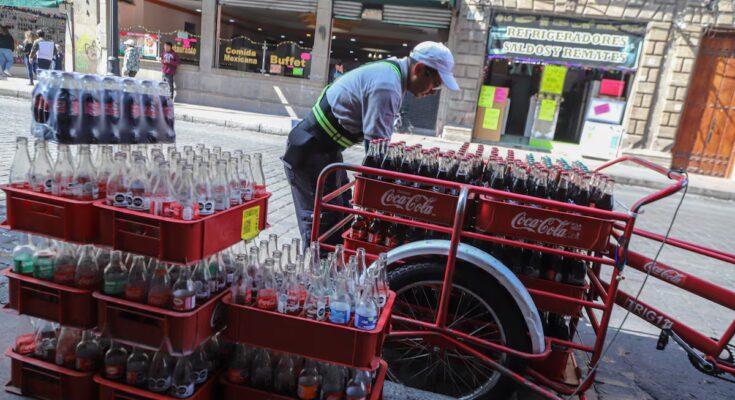The discussion on the increase of the special tax on production and services (IEPS) in Mexico has placed the Pascual Cooperative at the center of the fiscal and social debate. While Claudia Sheinbaum’s government argues that the tax increase aims to reduce sugar consumption and improve public health, the cooperative warns that the change could put at risk its liquidity and viability, the employment of its workers and the production chain that supports hundreds of families.
The government defends the IEPS as a “healthy” tax to address public health problems, such as diabetes and obesity. However, specialists question its real effectiveness and warn about its possible effects.
Dr. Elba Jiménez Solares, co-author of the book Sugary drinks tax: is the current IEPS regulation efficient, coherent and fulfilling its non-tax purpose? and professor of law at the Faculty of Higher Studies of Acatlán, UNAM, explains to this newspaper that the issue of health cannot be solved just with a tax, but with global strategies that include healthy food and educational alternatives for the population.
What does the Pascual Cooperative ask for?
At the center of discussions about increasing the IEPS on sugary drinks is Cooperativa Pascual, a leading company in the Mexican soft drinks sector. Founded in the late 1930s, it faced a decisive strike in May 1982, when the then owner refused to honor a pay raise. After a long conflict, the workers managed to transform the company into a cooperative, an autonomous and voluntary association in which they pool their resources.
The cooperative makes juices and sodas with natural fruit and cane sugar of Mexican origin, which, they say, ends up being an economic disadvantage compared to large soda companies that use high-fructose syrups, a sweetener that costs up to 40% less. For this reason Pascual has asked for differentiated tax treatment that would allow him to maneuver against the tax increase.
It therefore proposes to maintain the current IEPS of 1.64 pesos per liter for products made with natural and domestic inputs, in companies that generate formal jobs in communities.
The cooperative argues that an increase of more than three pesos per liter in the final price of its drinks would seriously undermine its competitiveness, as it claims to have only 2% of the Mexican soft drinks market, compared to the 98% dominated by giants such as Coca Cola and Pepsi.
What does the Sheinbaum government say?
President Claudia Sheinbaum reiterated her sympathy for Pascual. During her morning briefing on November 7, the president said that her government “loves the cooperative very much” and that they will begin negotiations on the fee increase.
From then on, dialogue tables were held between the Ministry of Finance, the Ministry of Health and the cooperative to analyze the alternatives. However, Jiménez Solares believes it is unlikely that the Government will change the tax law, because in the Federal Expenditure Budget decree it is already contemplated with its collection projections.
He also warns that if the government opens the door to changing the law, this could become a reason for other companies to want to apply pressure.
Why is IEPS being reconsidered?
The IEPS taxes items such as alcohol, tobacco, sugary drinks, or high-calorie non-staple foods, products that the state considers nonessential and whose consumption it seeks to discourage.
In Mexico, the IEPS on sugary drinks began in 2014 with a rate of one peso per liter. However, the Government has announced an increase starting from 2026 with which the tax will go from 1.64 to 3.08 pesos per liter on drinks with added sugars. Furthermore, for the first time, the tax will also be applied to light and sugar-free drinks.
The adjustment takes place in a country where an average of 166 liters of soft drinks are consumed per capita per year and where one in three new cases of diabetes mellitus are attributed to the consumption of sugary drinks, according to data from the Ministry of Health.
In theory, the measure aims to curb public health problems. However, Jiménez Solares points out that from 2014 to today, only during the first year the tax on sugary drinks decreased consumption among the population, but from 2015 to 2025 it increased.
The healthcare panorama confirms this. According to INEGI data, diabetes in 2024 mellitus It was the second leading cause of death in Mexico, with more than 112,600 deaths, and four in ten school-age children and adolescents live overweight and obese, according to a study presented in June by the Ministry of Education (SEP).
A fee without any guarantee of improved health
Another of the central concerns about the tax increase is that there is no clarity on where the proceeds will go. Jiménez Solares underlines that in the spending budget there is no item dedicated to programs for the prevention of diabetes or obesity, and that it is not known whether the proceeds can really be used to combat public health problems.
“The health issue cannot be fought only through tax collection,” he warns. “If we want to end obesity and diabetes, we need to create a comprehensive policy of access to nutrition education, as well as healthy and affordable foods,” he concludes.
Sign up here to the EL PAÍS México newsletter and receive all the key information on current affairs in this country.



